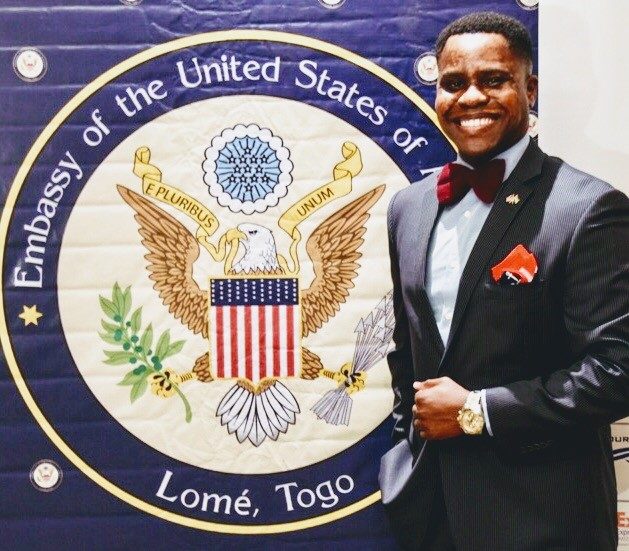
by Madison McHugh | Sep 12, 2018 | Graduate Students, Internship Experiences
My name is Erick Agbleke. While in pursuit of my graduate studies in International Relations and Diplomacy, along with specializations in International Security and Global Negotiation and Conflict Management, I was given the opportunity to intern with the State Department at a US Embassy of my choice. Since I was born in Togo, West Africa, I opted to spend 10 weeks at the Lomé Embassy with the Political and Economic (Pol-Econ) section of the mission. I wanted to return to my country of birth after spending 16 years abroad, to witness and study what kind of effects that U.S. international policies would have on a political climate I am familiar with.
A highlight of my internship with the State Department was a project assigned to me by the Chief of Section (CoS) to strengthen my security background. I wrote and recommended a strategy outline to combat wildlife trafficking in Togo based on the Eliminate Neutralize and Disrupt (END) Wildlife Trafficking Act of 2016. My recommendations, if approved by the State Department’s Office of Economic Growth, Energy and Environment, would be implemented as a policy and included in an annual congressional report. I relied on past project management skills that I developed through my professional career as well as my data collection skills to complete the necessary analysis.
Located south of Burkina Faso and east of Benin, Togo has become a transit state for ivory traffickers smuggling illegal goods. The traffickers take advantage of the porous borders and enter Togo with ivory in its raw form and make their way to Lomé to transform the ivory into art relics transported and sold elsewhere. Lomé is a strategic city for the smugglers because it gives them multitude avenues of exit. It is equipped with an international airport and a seaport serving as the maritime hub for the region, and smugglers utilize these avenues of travel to take ivory into south-east Asia. After my initial analysis of the wildlife trafficking framework in Togo, I was able to address the shortfalls and recommend improvements on how to the government could benefit from a partnership with the U.S.
Interning with the State Department has intensified my desire to become a diplomat and work with other countries to overcome the same challenges we share across the world. In my coursework, I learn and process instances where all areas of international relations are intertwined, amplified by my hands-on experience abroad. I have gained a deeper understanding on how security, diplomacy, conflict resolution and economic development must reconcile with one another to advance towards a common solution. In reflecting on the experience, I would recommend this internship to my fellow colleagues, as it is a great way to gain insight into the wonderful work we do abroad as a country. It is also a great opportunity to apply and test the plethora of theories we learn and discuss in the classroom with our professors.
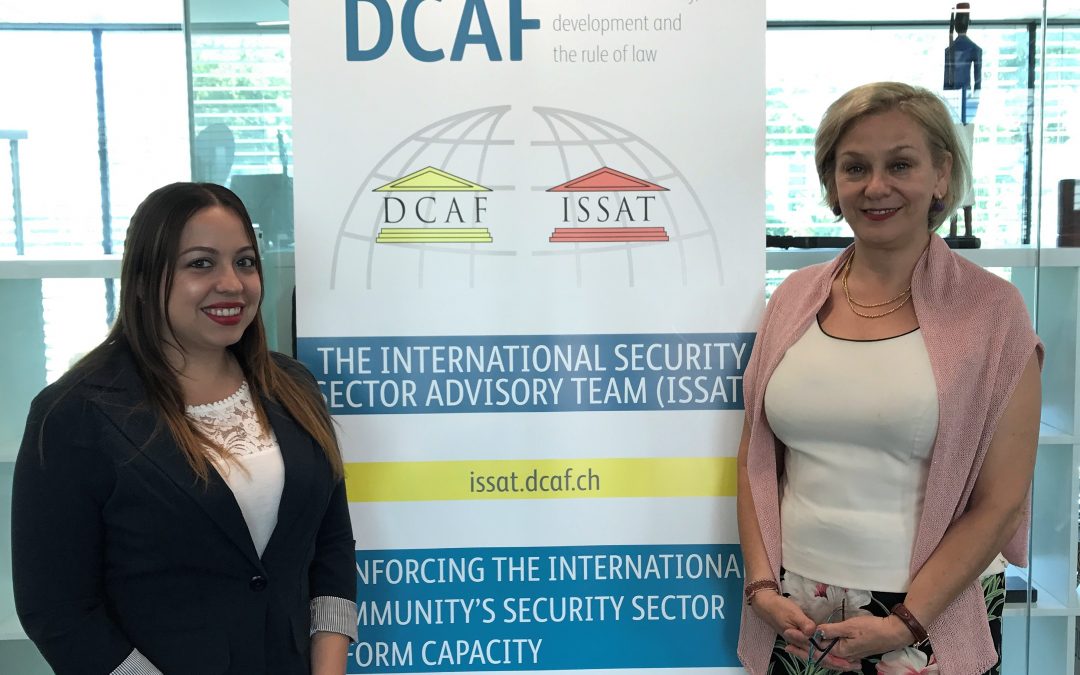
by Madison McHugh | Nov 1, 2017 | Graduate Students, Internship Experiences
My name is Marisela Rivera, and I am a Master of Arts candidate at Seton Hall`s School of Diplomacy and International Relations. Over the summer I had the pleasure of serving as the Sergio Vieira de Mello Fellow for the Geneva Centre for the Democratic Control of Armed Forces (DCAF) in Geneva, Switzerland, the international capital of the world. The fellowship honors a former United Nations Diplomat, Sergio Vieira de Mello, who was killed in the Canal Hotel bombing in Baghdad, Iraq in 2003. Mr. Vieira de Mello is remembered for his long and distinguished career with the UN as well as his efforts to promote peace, human rights and humanitarian aid.
Like Mr. Vieira de Mello, I am passionate about fulfilling peace and security for all. I specialized in two eminent concentrations to promote peace and security: International Law & Human Rights and International Security. My two specializations and my keen interest in Latin America have well prepared me for the fellowship. My host organization, DCAF, is an international foundation that is well-known for its support of security, development, and the rule of law.
Within the DCAF, I worked for the International Security Advisory Team (ISSAT). ISSAT was created to increase the capacity of the international community to support Security Sector Reform (SSR) processes, enhance the effectiveness and quality of SSR programming, and facilitate the coordination and coherence of international assistance for nationally-driven SSR processes. It focuses on four key services: advisory field support, training and capacity development, knowledge services, and advocacy and outreach.
Prior to my arrival, DCAF created a Latin America and Caribbean (LAC) department dedicated to Security Sector Reform. I worked with the director to set the foundation and sustainability flow for this particular department. Together, we created a strategy for LAC, as well as an overview of donors to the region. I utilized my social media and advertising skills to create a memorable LAC webpage, and I wrote country background notes, particularly in Latin American countries. In addition, I was tasked to develop a knowledge product for the Gender and Security section that applied a gender lens to explore the application of local ownership in SSR. The case study analyzed two countries and explore the lessons learned to increase the discussions on Women, Peace, and Security (WPS).
One of the most challenging and gratifying experiences was familiarizing myself with international security and human rights dialect in Spanish. Being of Colombian descent, Spanish is my first language. However, growing up in America and being part of the public education system, Spanish was not a priority. Through DCAF, I learned the importance of bilingualism and the various opportunities that it brings.
Overall, my time with DCAF was insightful and rewarding. I fulfilled many assignments in my area of study, and I was trusted with the duties of a Project Assistant as well as the work of an SSR Officer. My position at ISSAT offered first-hand experience in SSR, specifically in the international security aspect of my career. Given that this is the second year the Sergio Vieira de Mellow Fellowship was offered to a Seton Hall Graduate student, I would highly recommend my fellow peers to apply for this position in the future, and I know I will cherish the knowledge and experience gained with DCAF forever.
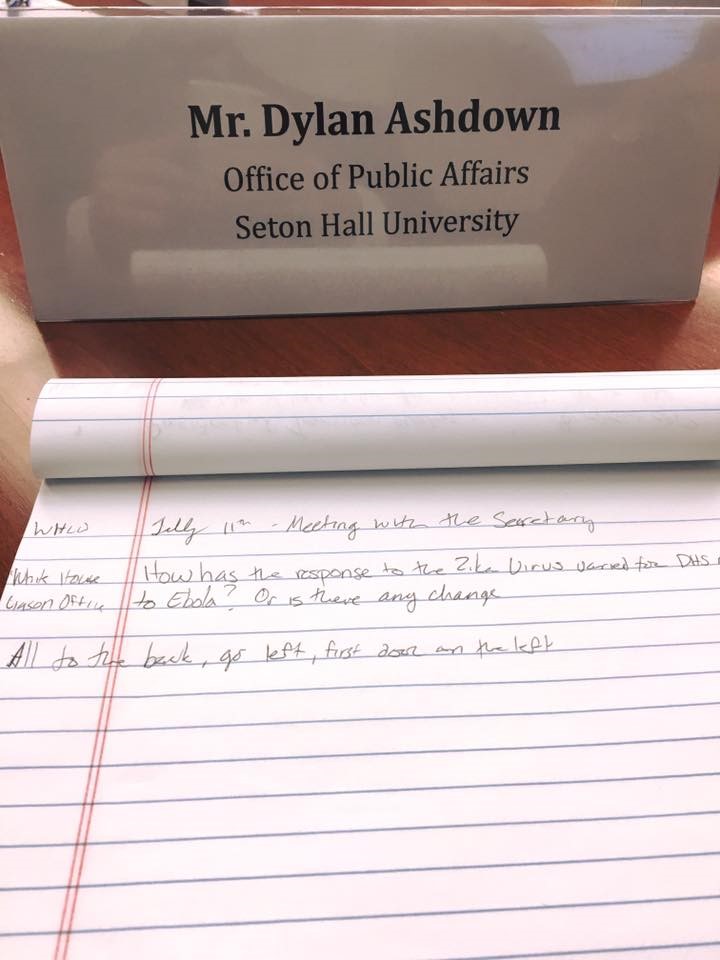
by Catherine Ruby | Aug 18, 2016 | Graduate Students, Internship Experiences
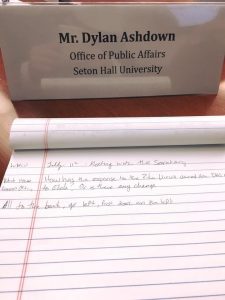
Finding a Home at Homeland Security
Hello, my name is Dylan Ashdown and I am currently a Public Affairs intern in the Office of Multimedia, Motion Pictures, and Television, Office of Public Affairs, Department of Homeland Security (DHS). At Seton Hall, I am finishing up two Master’s degrees which will be awarded to me at the end of my internship; one degree will be in Diplomacy and International Relations and the other is in Strategic Communication. This internship has been very beneficial and I highly recommend it to anyone who is interested!
I have the “cool” internship. I work directly with the writers and producers of documentaries, television shows, and feature films, along with other “non-news” media stakeholders. Both of my degrees have been of use in this internship. The other day a writer reached out to our office requesting DHS’s help with their show. I ended up spending a few hours researching where I would defect if I was a scientist escaping from an evil government in New York City for a script the writer was working on. This was something that was very relevant to my Diplomacy schooling. In terms of my Strategic Communication classes, I have put together pitch plans for movie producers and interviewed cybersecurity professionals, and technology experts/inventors (all of whom one can find in the Homeland Security).
There is always something exciting happening at DHS. For example, today I attended the daily morning briefing and found out that I was meeting the Secretary of Homeland Security in three hours. Three hour later, I am sitting in a room with 15 other interns getting a briefing directly from the Secretary. This is not your normal internship experience!
Ultimately, the best thing about my internship hasn’t been meeting politically famous people; the best part has been the mentorship that I have received from my supervisor. I never really understood the meaning of a mentor until I started this internship. I asked more questions in my month here at DHS than I ever did in my six years of school and my mentor has gone out of his way to answer all of them. I have learned how to walk, talk, and behave as a public affairs professional in Washington D.C. because of the hours that I have spent with my mentor and because of how much he trusts me to handle projects on my own.
The most rewarding part of my internship is knowing that my work has a direct impact on educating the American people on the work of the Department of Homeland Security. I am very happy that I chose to intern at the Department of Homeland Security, Office of Public Affairs.
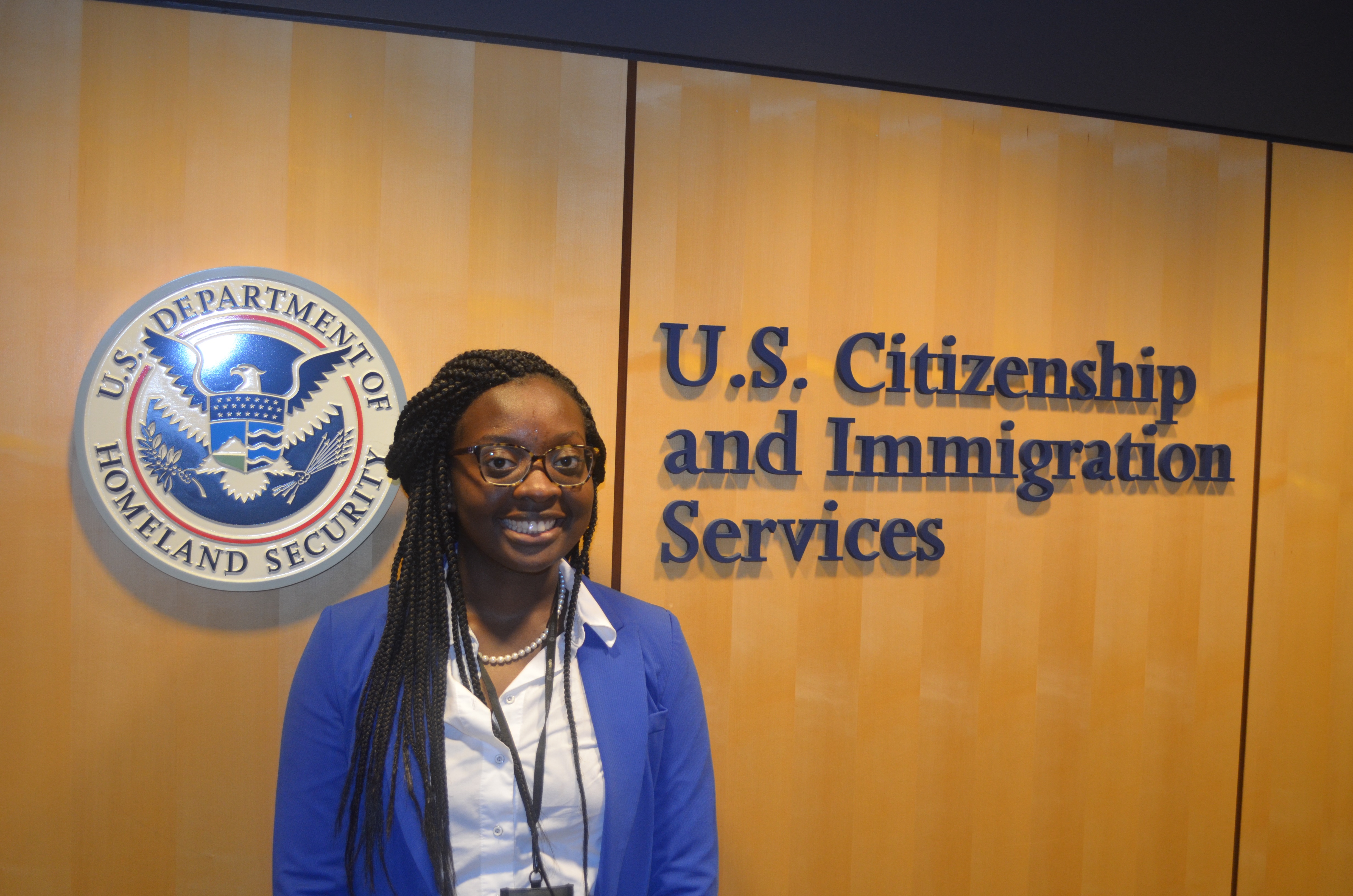
by Catherine Ruby | Aug 18, 2016 | Graduate Students, Internship Experiences

I am Nina Robinson, a dual degree candidate of the M.A. programs in Diplomacy and Asian Studies. I interned with the Department of Homeland Security: United States Citizenship and Immigration Services (USCIS), specifically with the Office of Privacy. My long-term goal is to become a Foreign Service Officer and to one day serve as a Career Ambassador. Since high school, after studying in China for two consecutive summers, I knew that I wanted to dedicate my life to a career in Diplomacy.
Essentially, my desire to hone my skills and apply the knowledge that I learned in my Diplomacy classes; gain Federal Government experience; and to prepare for a career serving the United States, is what led me to pursue an internship with DHS-USCIS. The Department of Homeland Security was created after the September 11, 2001 terrorist attacks, to safeguard the United States’ border. The agency’s mission is to protect all people, including U.S. citizens, permanent legal residents, immigrants, and non-U.S. citizens. The Department of Homeland Security has offices almost all over the world, which assists those who wish to become citizens and seek asylum due to fear of persecution or danger.
Working with the Department of Homeland Security- United States Citizenship and Immigration Services, introduced me to the many avenues that one may take to establish a federal career focused on international relations. The Office of Privacy, although a small office and often confused with civil liberties or security, plays an important role in the agency. USCIS works to ensure that citizens around the world have the opportunity to become U.S. citizens and provides benefits and services for immigrants. The Office of Privacy works to ensure that the work conducted in USCIS promotes transparency in the government and protects its clients who include non-U.S. citizens and immigrants. The Privacy Act of 1974, which was enacted after the Watergate scandal with then-President Richard Nixon, is the cornerstone of my office. This Act is what helps the Office of Privacy guarantee that information being collected from the people by the government is being protected. Our office ensures that immigrants’ and citizens’ personal information, provided to the Department of Homeland Security and the United States Citizenship and Immigration Services, is being protected, which includes informing clients of what their information is being used for and how it will be used.
In the short period of time I interned here, I have learned a tremendous amount. I have attended four trainings, all which are exclusive to the analysts and officers in the Office of Privacy. As not to go too far into specifics, I have learned about the importance of encrypting PII (Personal Identifiable Information) and various information sharing database sources that the United States and other partner countries use to identify suspected terrorists. Along with training, my office has also provided mentorship, helping me to familiarize myself with various Privacy Act Laws as it relates to the Federal Government and offering career related advice. My life-long dream of becoming an ambassador has not changed. However, Privacy has become a big issue in the world of International Affairs and is a growing field. Students who are looking to put their diplomacy and analytical skills to use may find Privacy an interesting and exciting alternative to the Diplomacy field.
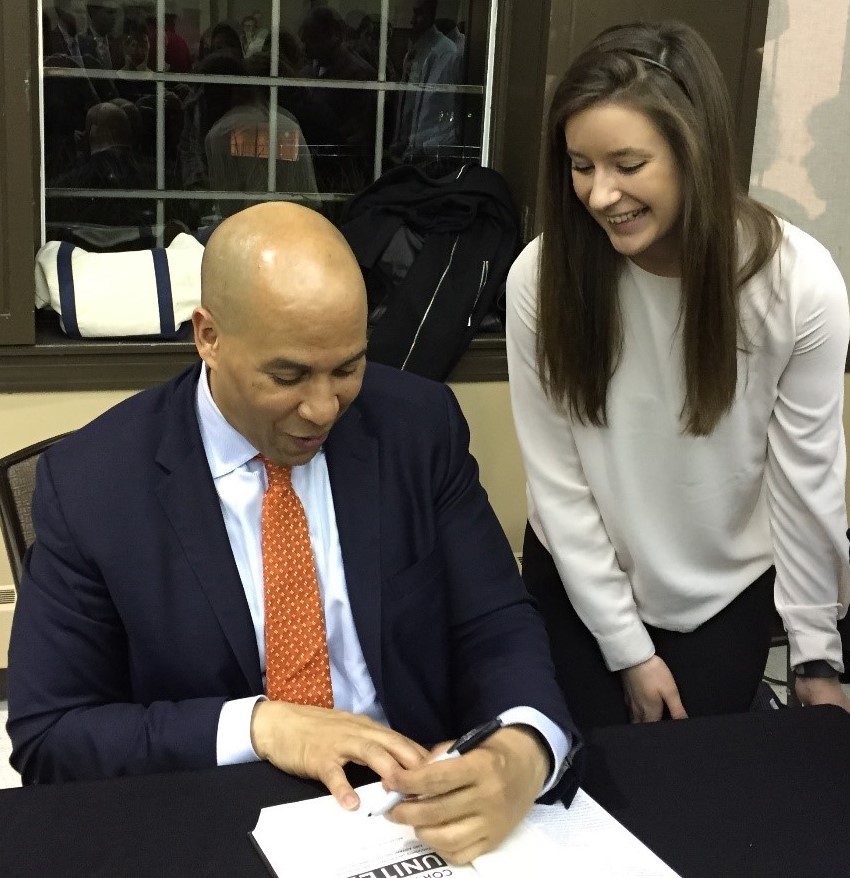
by Carolin Braxenthaler | May 5, 2016 | Internship Experiences, Undergraduate Students
Most people would describe the city of Newark as a struggling neighborhood of crime and poverty. However, my experience working for the Office of Senator Cory Booker has opened my eyes to see Newark and many other cities as thriving hubs of opportunity and development.
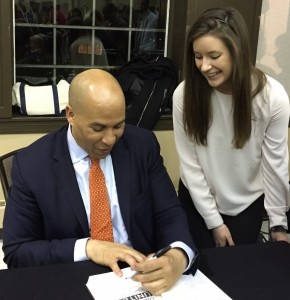
Diplomacy student Clare Duda with Senator Cory Booker
Senator Booker splits his time between Washington D.C. and New Jersey for congressional duties, travels in support of the 2016 presidential elections, and is currently on a book tour for his new bestseller “United”. As the Senator reports to his busy schedule, his office staff is the engine that keeps the congressional machine running. The Senator’s office in Newark is full of youthfully charged energy ready to take on any constituent inquiry, state development, and congressional opportunity released to the Senator. As an intern for a federal office, the day begins with a review of daily newspapers to keep each of the three senate offices, located in Washington D.C., Camden, and Newark, up to date with current events and happenings involving the state of New Jersey and Senator Booker himself. As time in the office of the Senator has passed I have had the opportunity to work with constituent advocates, case workers, and special project teams to work on policy memos, research speech materials, and respond to constituent requests.
Constituents usually write to the Senator when they are in need of help and have nowhere else to turn. I have had the opportunity to work on cases regarding immigration, environmental concerns, military affairs, health, and education. Along with deciphering if a new case can be developed by a federal office, I have interacted with constituents one on one, gaging cases and assigning each one to the proper caseworker to take care of their issue. The Senator’s office is dedicated to assisting constituents with concerns. I have become a part of a team which has reached out on behalf of immigration visas, retrieved documents from the VA, and worked with Medicaid providers to deliver health care resources to constituents who could not afford them. As time has passed in the Newark office I have witnessed the level of dedication each staff member has to their job and the citizens of New Jersey. The senatorial staff has exemplified dedication, professionalism, and compassion within the workplace and I would encourage anyone to write to the office of Senator Booker if they were ever to have a congressional inquiry.
As an international relations and diplomacy major I focus my interest in the national security and intelligence sectors of the federal government. I use talents developed through the School of International Relations and Diplomacy to brief policy documents, critically analyze cases, and develop writing samples for community outreach. Working for Senator Booker has provided me with the foresight of how a federal office operates and has furthered my interest in a future of public service. From my internship I gained skills of time management, adoption of new ideas, and adaptation to new opportunities. Offering support to the congressional staff and the constituents of New Jersey has been both rewarding and fulfilling. Similar to the city of Newark, I realized the potential I hold in creating change, whether big or small; every action I take is growth. Working for the Office of the Senator has given me construction materials to expand my own personal development.

by Carolin Braxenthaler | May 5, 2016 | Graduate Students, Internship Experiences
My interview to be an intelligence intern with the New Jersey Transit Police Department (NJTPD) promised me all the things I had lacked in my first internship. There would be daily tasks, circumstance-specific tasks, and broader projects. I would be thoroughly trained on multiple databases and computer programs. I would assume a small level of responsibility for the activities within the office, and if I had any questions, or faced any roadblocks, they would be addressed. I would, ultimately, learn what I needed to know to eventually get a job as an analyst.
My experience here at the NJTPD intelligence office has been so much more than that. On your first day, you are introduced to a whole floor of people who welcome you enthusiastically and all say, “welcome to the team!” Even if you don’t know it yet, your job has a purpose. It also makes your experience easier to sell to a potential employment opportunity.
There is a perfect combination of learning a lot, very quickly, but with mentors who have the utmost patience for you. The office exudes a beautiful harmony of camaraderie and professionalism. You will have fun, and you will learn. You will go on field trips, have the opportunity to talk to people of all ranks in many contexts, and learn the fundamentals of a state security institution. You will learn how to be productive, and your mistakes will be readily forgiven. If there is a more positive place to fulfill an internship requirement, I can’t imagine one. If you are looking for an internship that will actually involve you in the operations of the system and make you a valuable candidate on the job market, you should seriously consider the NJTPD.
I decided on this internship through conversations with peers who had done it before, and a realization of my own desire to be a part of the intelligence community. This internship allows graduate students a really incredible and understated opportunity to be involved in intelligence work.
by Laurel Stone | Apr 5, 2013 | Graduate Students, Internship Experiences
 The past two weeks were a little stressful and hectic as I planned a luncheon for a VIP
The past two weeks were a little stressful and hectic as I planned a luncheon for a VIP
discussion about Afghanistan Beyond 2014. After finding a venue and figuring out the
other logistics for the event, I was tasked with compiling a limited guest list and then
contacting each person individually. The most incredible aspect of this responsibility was
having the opportunity to contact the heads of several Permanent UN missions and
Departments. Ultimately, we had a full guest list and attendance for the luncheon. Three
Afghan civil society leaders came to NYC for the event, and the countries having
significant involvement in Afghanistan were all represented. Additionally, the UN
Department of Political Affairs, Department of Peacekeeping Operations, UNDP,
UNICEF, and Secretariat were all represented as well. I was able to attend the
luncheon, and the discussion between these 30 policy makers and practitioners was
truly incredible. I was able to meet and network with several of those that attended, and
I also now have the opportunity to write an article for World Policy Institute about the
event. This was definitely an amazing opportunity to see people in the field finding
solutions to a very complex situation which will have great impact in the next couple
years.
Read the article Laurel published here: http://www.worldpolicy.org/blog/2013/02/22/afghanistan-beyond-2014










